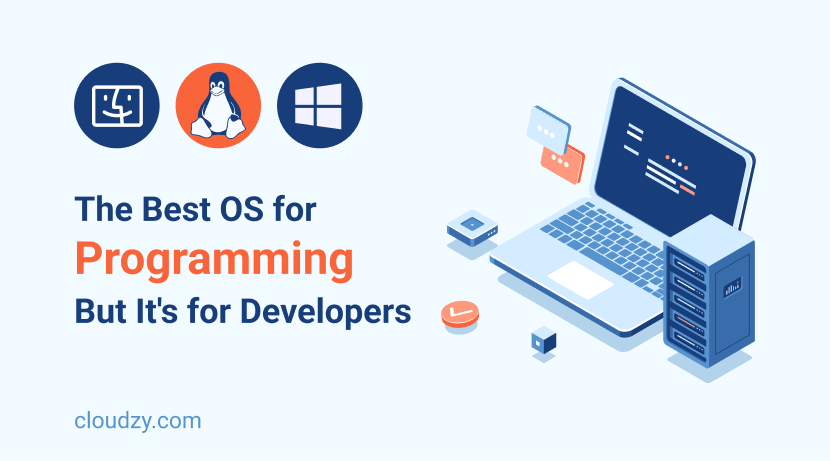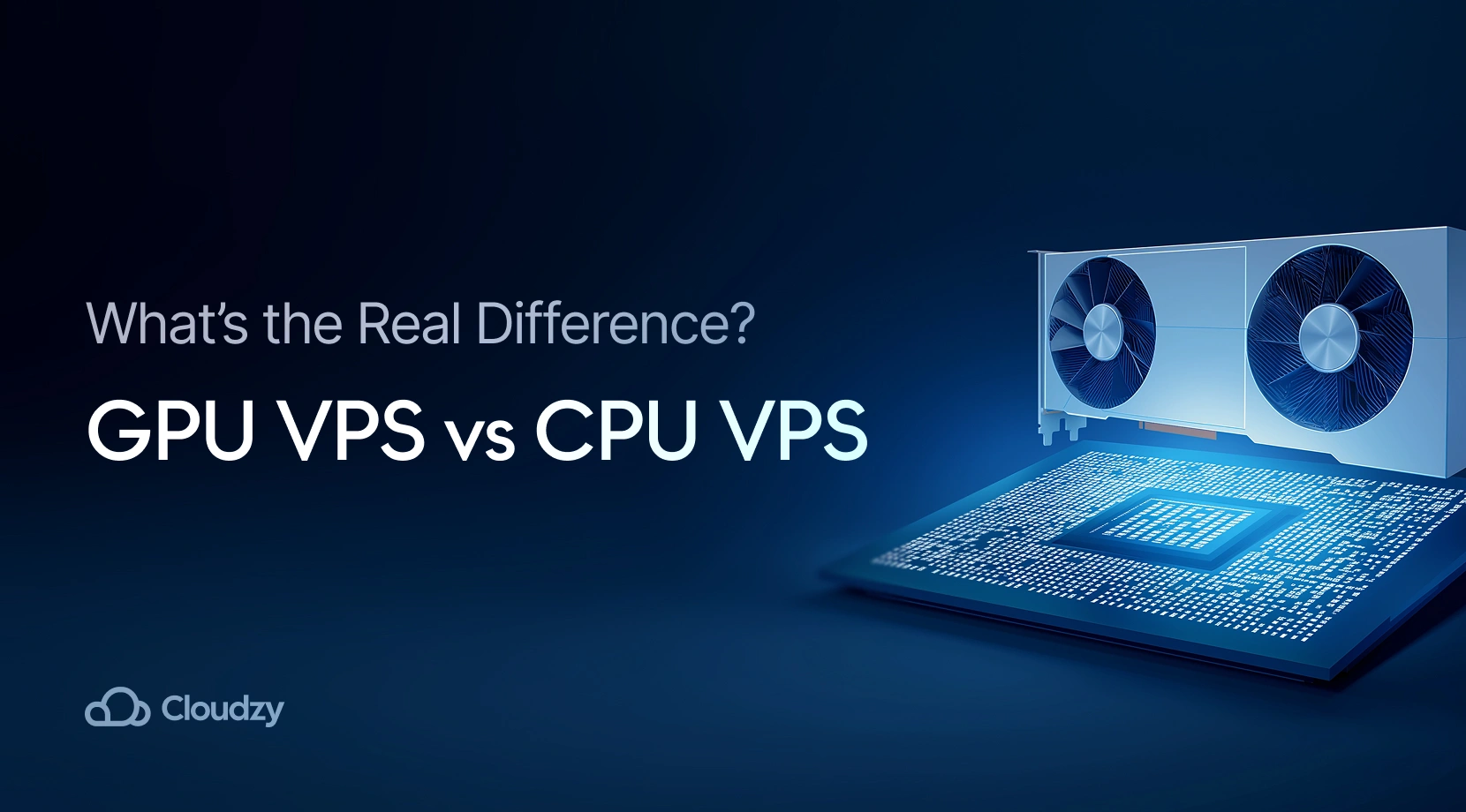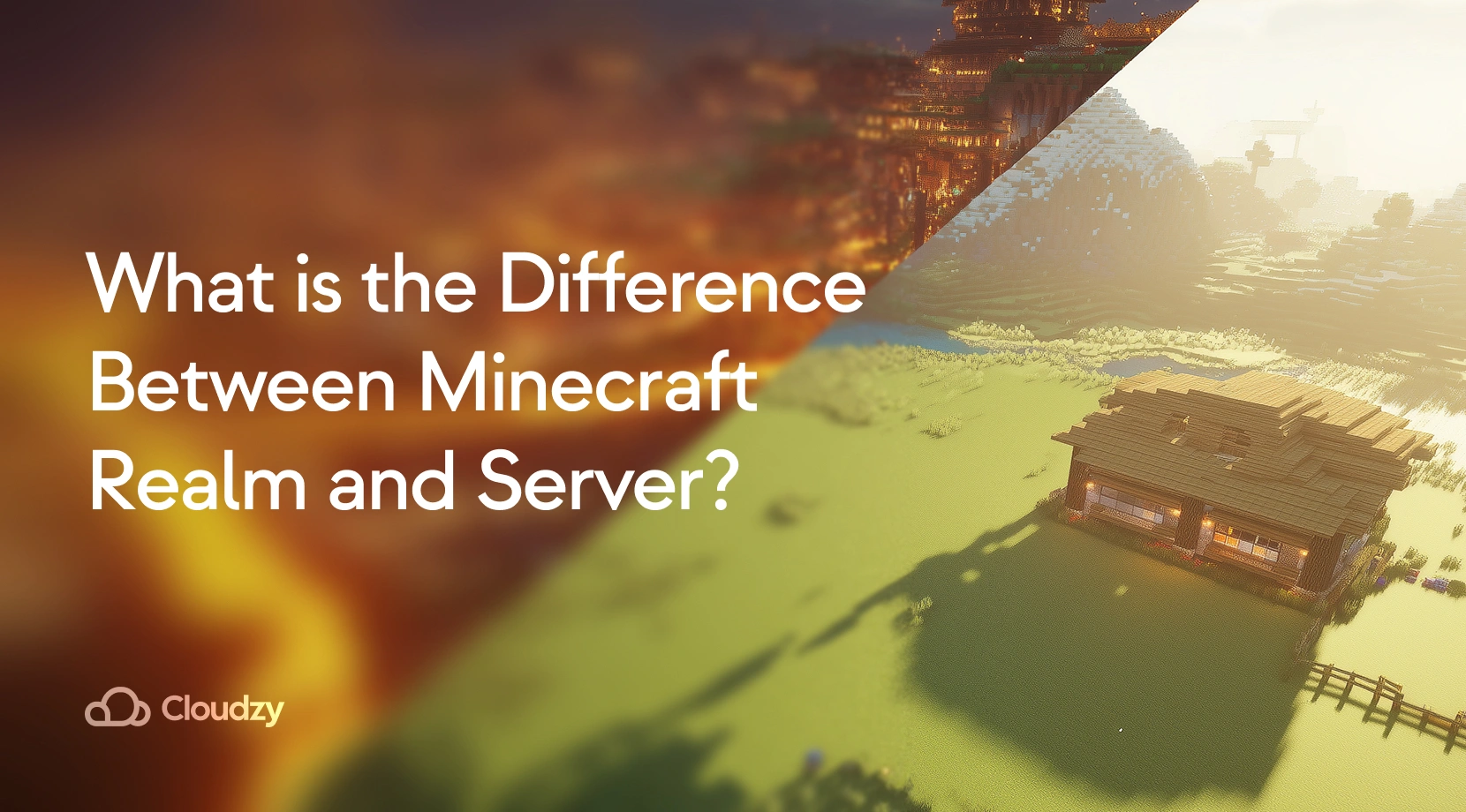Whether you’re an experienced programmer or you’re just starting out, the choice of OS is an ongoing challenge in your career. And with 2023 well underway, it’s important to keep current on new trends and stay informed about things an OS offers and things it lacks to provide. In this blog post, we’ll review the advantages, disadvantages, and use cases of the top three operating systems and try to determine which is the best OS for programming. Windows, macOS, or Linux?
Does the OS Really Matter?
Almost no factor in the world of programming affects your experience and the quality of your work as much as the OS. There’s always a relationship between your programming task and your OS. Imagine you want to develop an Android app. In this case, you should choose an OS that aligns with that platform, so the process of developing the app and the outcome are both smooth and error-free. Here’s a list of reasons why different programming tasks require different OSs:
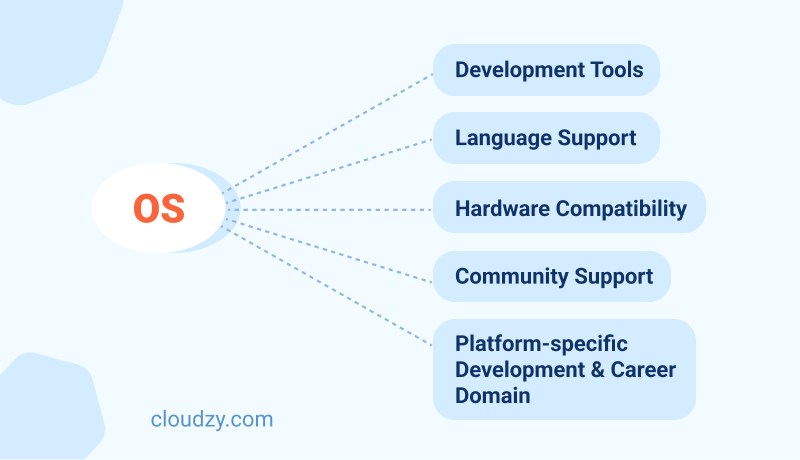
-
Development Tools
In your programming process, you certainly need and use specific tools, IDEs, libraries, etc. Different operating systems offer different sets of these tools. Take one of the most popular IDEs, Visual Studio, as an example. Visual Studio has a comprehensive set of tools and plugins with support for at least ten programming languages, But as a tool developed by Microsoft, it’s only available on Windows. This example illustrates how the choice of OS may limit you in using some tools and affect your workflow and efficiency for the better or worse.
-
Language Support
Although most programming languages are versatile and can be compiled in a wide range of platforms, some of them are not compatible with every OS out there. Also, some OSs may not have a built-in compiler or interpreter for a specific language, or they may not have the capacity to install tools designed for that language. C is a good example here. Although many tech savvies believe C runs the world, Windows doesn’t run C. Unlike Linux, the Windows operating system doesn’t have a built-in C compiler, and if you want to write C code on Windows, you have to first install a C compiler like MinGW.
-
Hardware Compatibility
Hardware compatibility is another important factor influencing the choice of OS. To program specific hardware, you should look for compatible OS options. Take embedded systems development as an example. FreeRTOS is an OS specially designed for developing embedded systems like micro controllers, so it can provide the necessary tools, drivers, and libraries for this purpose better than general OSs.
-
Community Support
Programming is heavy work that requires a lot of technical guidance. Whether you want to develop software or make a web application, several troubles come knocking on your door, and without a supportive community, you’ll have a hard time tackling them. The programming community associated with the OS is a great chance to seek help, solve problems, and also learn and improve. So, it’s an important factor to take into account before choosing an OS.
-
Platform-specific Development & Career Domain
The fact that what you’re developing directly affects your OS is as plain as day. If you’re making a Windows desktop application or an iOS app, your choice of OS is highly limited since you should choose an OS that aligns with the platform of your app. Your choice of OS is also influenced by the programming field in which you work, as certain fields tend to favor specific OS options. For example, many game developers prefer to work on Windows due to its high compatibility with game development tools and target platforms.
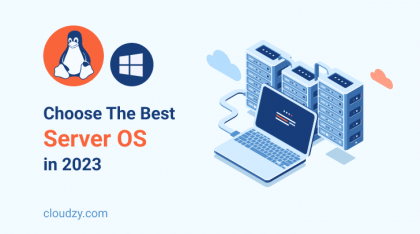
Overview of the Top Operating Systems for Programming
In this section, we’ll dive deeper into the technical features of the most commonly used operating systems to find the best OS for programming. We’ll highlight their features and resources with a specific focus on programming.
Windows
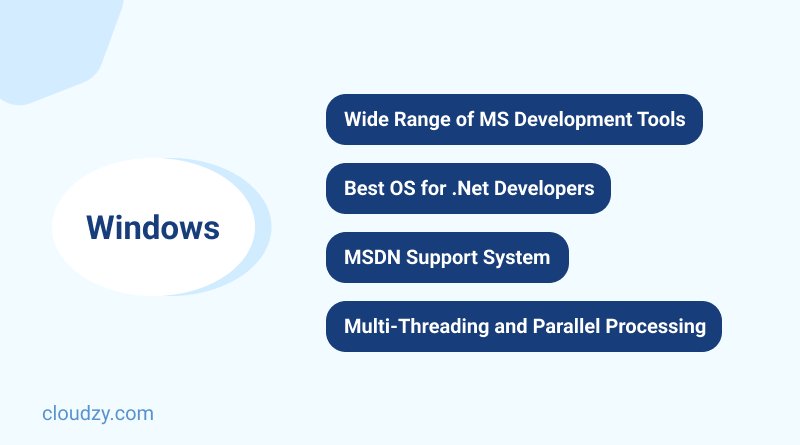
Windows is a popular OS among programmers from different fields. Its popularity is mainly due to the wide range of Microsoft development tools, including Visual Studio. Visual Studio is an IDE and code editor available on Windows that offers useful features like debugging and project management options. It’s a user friendly and easy-to-use tool for programmers who are just starting out, as well as those who’ve been around the block for a long time.
Windows is also the best operating system for .Net developers allowing them to make all sorts of applications, from desktop to mobile apps, with its comprehensive set of libraries. It’s also a great option for UI specialists for one sole reason: Windows Presentation Foundation (WPF). WPF .NET is a powerful UI framework used with .NET.
Windows has something special for everyone, including Web developers. ASP.NET allows web developers to make dynamic web-based solutions, including web pages, web applications, and web APIs using an event-driven model of interacting with web applications. Just like WPF, it’s integrated into the .NET platform for accessing a wide range of libraries and tools.
If you’re a game developer, Windows has also got you covered. Windows has a widely used multimedia framework called DirectX API. DirectX is a wide set of applications in which Microsoft has included everything you need for game development. Game developers can use it for developing Windows and Xbox video games.
In terms of community and support, Windows benefits from a thorough and straightforward technical documentation called the Microsoft Developers Network or MSDN, which is a great help for anyone needing technical support and tutorials.
Regarding performance, Windows supports multi-threading and parallel processing making it an efficient option for managing a good range of programming tasks.
Overall, Windows can really be the best OS for programming if their tasks revolve around areas in which Windows shines.
MacOS
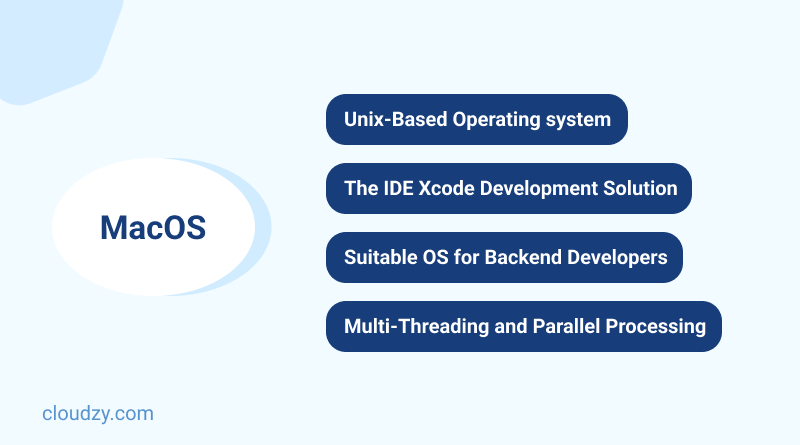
MacOS is another popular OS among programmers used on Apple’s Macintosh computers. MacOS is built on top of Unix, especially the BSD variant, meaning that the Unix operating system is the foundation for macOS’s core,
Why is the fact that it’s Unix-based important? Because of the terminal. Programmers execute a lot of command-line tasks on a regular basis. A terminal capable of running all sorts of commands for managing and configuring the OS is a must for programming. Since the terminal of MacOS is based on the Unix shell, it can run standard and popular Unix commands and scripts.
Now let’s talk about all the useful development tools Apple offers for programming on MacOS. Apple’s Xcode development environment is an IDE that supports multiple programming languages for developing MacOS, iOS, WatchOS applications, etc.
Apple also has specific tools for backend development, such as Swift and Vapor. Swift is a programming language made by Apple, and Vapor is Apple’s server-side framework that’s developed using Swift. Vapor is used for creating web APIs and web applications and is popular for streamlining common web development tasks and offering a rich set of tools and libraries. The combination of Vapor, Swift, and Xcode makes creating end-to-end web solutions easier than ever.
In terms of performance, MacOS is only designed for Mac computers, so the hardware and the software integrate perfectly, resulting in enhanced performance and optimization. MacOS effectively supports multi-threading and parallel processing, so you can fully use the system’s processing power. This OS also leverages other advanced features for better performance, such as memory management which results in efficient resource allocation, and advanced graphics rendering capabilities, which helps developers in multimedia fields to make more visually appealing applications.
MacOS has a vibrant and active community of passionate and willing to help technicians. Apple also offers thorough technical documentation for macOS developers that includes guides and tutorials.
Overall, if you want to program in a Unix-based environment, get a fully functional terminal, and benefit from robust security strategies, then MacOS is the best OS for you.
Linux
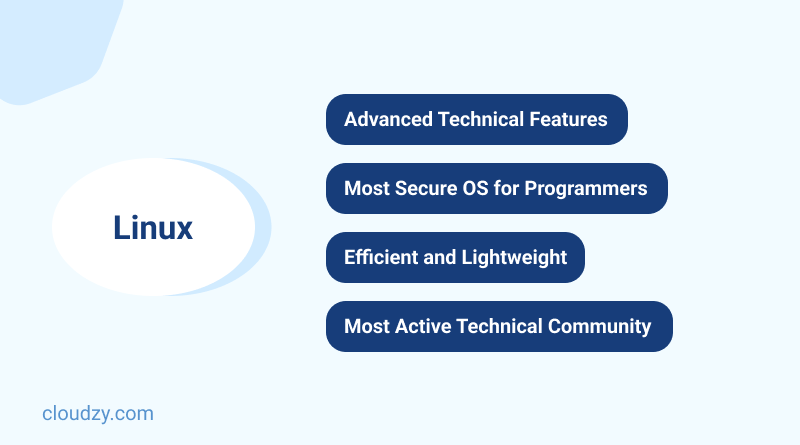
It’s not possible to answer what’s the best operating system for programming without reviewing Linux. As the only open-source OS among our options, Linux is brought to us by Linus Torvalds, a software developer, and a free software activist. The open-source nature of Linux is the reason behind most of its advanced technical features. To name these features, let’s start with security. Linux is probably the most secure OS since many programmers are working on it in real-time all around the world. So it’s very unlikely that there’s a vulnerability or a bug that hackers see before those devotees.
Regarding performance, Linux is very efficient and highly optimized regarding resource utilization. This efficiency is mainly because most Linux distros are lightweight; thus, programmers can allocate most of the system resources to programming tasks. Using Linux, the technical resources of your machine are less of a limitation, Linux is designed to run on a wide range of hardware configurations. Whether you work on a low-powered laptop or a high-performance server, the versatility of Linux ensures that you can use the full potential of your device. Multi-threading, parallel processing, and process scheduling are other advanced features that make Linux’s performance exceptional.
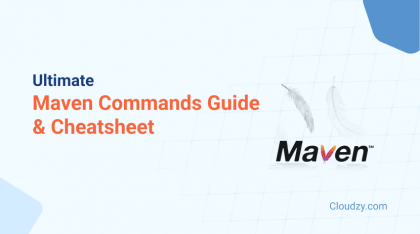
Another important aspect of Linux is that it leaves you free to configure and customize your system to suit your needs. Almost all Linux distros allow you to change almost everything. And that’s the beauty of Linux; you’re the one setting the defaults, not the company that developed the OS.
Linux’s community is by far one of the most active communities in the tech industry. The reason for this is again the open-source nature of Linux which means it’s built on collaboration and feedback of several developers. So, there are lots of forums, discussion boards, and documentation.
Regarding development tools, features, and the software set you get to work with in Linux are very diverse due to the continuous work of the community on a wide variety of Linux distros which we’ll cover in the next section of this blog.
Summary Table
| Area of Comparison | Windows | MacOS | Linux |
| Processing power | Supports high-performance processors like Intel Core i9, allowing resource-intensive tasks to run perfectly. | Designed for Apple’s hardware, resulting in seamless integration and optimized performance. | Works seamlessly on a wide range of low-end and high-end hardware configurations. |
| Development tools | Has a comprehensive suite of development tools like Visual Studio and supports a wide range of languages. | With tools like Xcode, IDE provides a productive environment for developers. | Offers a wide range of distro, each with its own unique set of software packages. |
| Community support | Windows has a very large user base and a supportive community with online forums and technical documentation. | The Apple development ecosystem has a supportive community of developers, forums, and documentation. | Has the biggest community of developers who are actively working on the platform to improve it. |
| Beginner friendliness | Has the most user-friendly and beginner-friendly interface. | Considering the available documentation, support, and user-friendly interface, it’s a beginner-friendly option. | The steep learning curve and the command-line interface make Linux a bit intimidating for beginners. |
| Configurability | Windows is considered a configurable OS offering customization options for tweaking the system to your needs. | Less customizable than the other two options since it doesn’t allow deep system-level customization. | Highly configurable, offering full control over the system for customization. |
If you’re experiencing difficulty reading this table, you can find the complete summary table in the provided file.
Top Three Linux Distributions for Programming
The best Linux distro for programming should have a few characteristics in order to be adequate for programming. Firstly it should be one that many other programmers in your field are already using, so there are lots of great resources for troubleshooting and error handling. The best Linux OS for programming should also release frequent updates so users have a bug-free version with newer features. Considering these factors, let’s talk about the best distro for programming.

Ubuntu
Ubuntu is a popular Linux distro among programmers for a set of reasons; security, stability, friendly interface, and high performance set Ubuntu apart from other similar options. Ubuntu offers a wide set of development tools for various purposes. Ubuntu’s software center, with lots of free tools and applications, is another reason Ubuntu is a great choice for programming.
System Requirement for Ubuntu
- 2 GHz CPU
- 4 GB RAM
- 25 GB disk
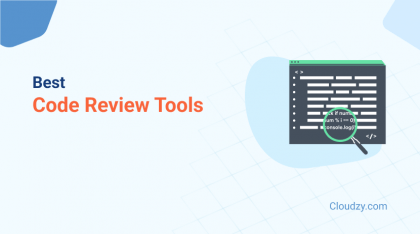
Fedora
Among Linux distros, Fedora is the one with new features and up-to-date software. It’s pretty easy to install, set up, and use and has a great developer portal with in-depth how-to guides and tools. For example, if you want to program hardware devices like Arduino, Fedora’s developer portal has a full guide on how to accomplish that on Fedora. It also has top-level IDEs like Eclipse.
System Requirement for Fedora
- 2 GHz CPU
- 4 GB RAM
- 20 GB disk
Debian
As a community-driven OS, Debian is known for its stability. Every new update of Debian undergoes rigorous testing, ensuring that the OS remains reliable and bug-free, which is an important factor in finding the best Linux distro for developers. The wide range of Debian’s software repository is another reason for its compatibility with programming.
System Requirement for Debian
- 1 GHz CPU
- 1 GB RAM
- 10 GB disk
To Recap
In this blog post, we discussed the best OS for programming and provided a technical review of the most used OSs, including Windows, Linux, and MacOS. Overall, the choice of OS for programming comes down to three factors; personal preference, technical requirements, and programming domain. We also introduced functional Linux distros for developers. You have to consider all these factors in order to find the best OS for coding that fulfills your needs.
If you’ve made a Python bot and are looking for a way to test it, or simpler, if you just want to code in a stable environment, Cloudzy’s Python VPS is the best cloud-based solution for you. You can choose a Linux distro that suits your needs and have it preinstalled on your VPS. With zero latency, root access, and AI-powered DDoS protection, experience a programming environment with 24/7 connectivity, full control, and high security. Check out our affordable Python VPS plans starting at 4.95.
Get a Python VPS to easily reach its full potential and a high-performance, low latency server that you can use to develop, test, and, most significantly, deploy Python web apps. A VPS with no limitation
A VPS with no limitation
FAQ
What is the best OS for programming?
The answer to this question highly relies on personal taste and preference and the programming domain you’re active in. For a field like game development, Windows is usually the preferred option. While for web solution building, Linux can be the best OS.
What OS is best for AI development?
A good OS for AI development should support machine learning frameworks and tools. It should also be fast and secure. Considering all these, Ubuntu is a good choice of OS for AI development.
What is the best OS for web development?
A good OS for web development should offer a wide range of development tools and environments for web development workflows. All the popular OSs, including MacOS, Windows, and Linux (especially Ubuntu) can be great choices for web development.
What OS do most websites run on?
Among the top websites on the Internet, more than half of them use Linux as the operating system of their web servers. And the most common distributions of Linux for web hosting are Ubuntu and CentOS.

